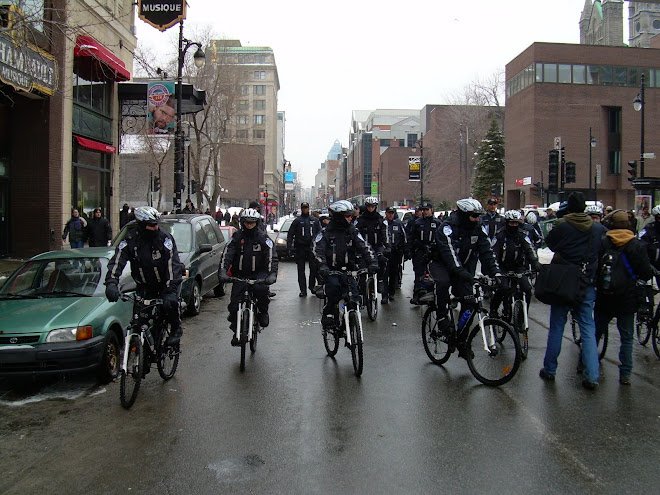Among some of the more-or-less ongoing elements in Greece that are being connected with radical-left political causes and claims (and getting international media attention for once, painfully alarmist though it may be) is a sporadic spate of 'violent' actions (bombings etc.) hat have taken place recently and been attributed to 'revolutionary' or 'anarchist' splinter groups a la Baader-Meinhof. I think it is important to emphasize that they are quite distinct from, though not unrelated to, the wider public protests, occupations and actions - recent bomb attacks on banks and a couple of firearms incidents targeting police and others seem likely to involve a very small number of people. But given the fact that this made Newsday.com today (and was subsequently re-posted on at least one left-wing blog out of Canada), I think it is worthy of note.
As far as the blogging aspect goes, this seems to be another example of the amplification and re-dissemination of mainstream media content on the Greek situation (though this one has yet to pop up on more greek-riots-dominated blogs I've highlighted, which are keeping pretty quiet). This is an interesting particular case, however, in that the article itself seems rather one-sidedly alarmist and negative in it's portrayal. Many on the left might believe that ''revolutionary action' of this type is problematic, but few (I would think) would be impressed by the tone and some of the implications here. Finding it offered, without commentary, on a radical-left blog can only lead me to conclude that readers are to make of it what they will - and that it is perhaps expected that most readers linking to such a source (i.e. the blog, not the original) might be inclined to 'get it.' One implication that I
It is particularly noticeable that this little artefact of the mainstream is exceptionally alarmist, drawing on 'talking heads': a former Greek minister, a criminology professor and a former US Embassy official in well-established style (though they do also quote from a communique of one of the groups, Revolutionary Struggle). The newsday.com article seems to represent a number of efforts or tendencies on the part of its authors/editors/contributing voices...
There is an attempt to establish that these groups are 'more violent' and have less popular support than past Greek examples (e.g. 17 November group) that are linked with fighting against Right-wing authoritarian politics and Amercian interference in that country, that they are 'more indiscriminate' than, say, Baader -Meinhof (Red Army Faction, W. Germany) - a winning combination that nudges an elbow (and gives a couple of winks) in favour of an implied comparison with "the style of the Irish Republican Army or Islamic jihadists." The suggestion is also made (in neutral, uncited journalistic voice) that these groups are 'exploiting' the December upheaval for essentially unknown and irrationally violent purposes. One apparently new group, the Sect of Revolutionaries, is described (in reference to a communique selectively quoted) as "striking for its cynicism and lack of political ideology or any attempt to garner public support." Not long after, a former US embassy official is quoted as suggesting that for these 'new' elements, "human life is no longer precious." This, my friends, would be what Alain Touraine would have to recognize as a major battle over historicity: come the currents described here seem to amount to cutting such groups off from any political motivation, from any (remotely legitimate) historical precedent, from any semblance of public support, from any association with moral or ethical considerations, etc...
The question of violence in radical anti-capitalist movements is highlighted here, in that the links between these groups and wider movements is questionable and ambiguous (many anarchists and leftists explicitly denounce this kind of thing for a variety of reasons), the tactical wisdom of of the notion may be less than apt (and should they ever decide to actually kill anyone, subject to some hard questioning as to its justificability), and the meaning of 'violence' seems a bit confused and ambiguous, unless it refers to rhetoric or property damage.
According to the former Greek public order mininter, "current militants 'are much more violent and much more murderous,' " than the well-kown November 17 group that operated from the mid-1970s to 2002 and killed 23 people and carried out a 100 or so attacks. They haven't actually killed anyone, of course.
I've posted a few select portions from the article, below; the real deal can be viewed at:
http://www.newsday.com/news/nationworld/world/sns-ap-eu-greece-terrorism-analysis,0,2579389.story
"ATHENS, Greece (AP) — A new and possibly more dangerous generation of Greek extremists is escalating attacks against police and symbols of capitalism, years after authorities believed they had stamped out domestic terrorism.
[...]
Nobody has been killed so far but authorities are alarmed that the terror tactics appear to demonstrate a desire to carry out indiscriminate slaughter.
[...]
They have sought to portray themselves as urban revolutionaries who champion the poor and fight for the oppressed, and espoused anti-capitalist, anti-American and anti-European Union rhetoric.
But experts fear the current generation, such as Revolutionary Struggle which first appeared in 2003 and is best known for firing a rocket-propelled grenade at the U.S. Embassy in 2007, are motivated less by ideology than a desire to carry out carnage, and have shown little interest in winning public support."
Subscribe to:
Post Comments (Atom)


No comments:
Post a Comment